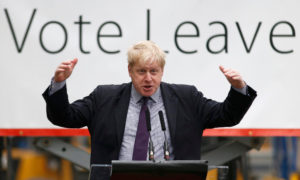Brexit vote coming down to the wire
Making sense of the rival campaigns and arguments around Britain’s historic ‘Brexit’ vote on June 23 is bit like trying to thread a needle while looking through a kaleidoscope such is the lying, self-interest and panic peddling.
And just like TV’s play school depending through which issue ‘window’ you look, you get a different story.
Those who favor leaving argue that the European Union has changed enormously over the last four decades with regard to the size and the reach of its bureaucracy, diminishing British influence and sovereignty.
Those who want to stay say that a medium-size island nation needs to be part of a larger bloc of like-minded countries to have real influence and security in the world, and that leaving would be economically costly.
A major part of the debate is about migration.
 Ex-London mayor and ‘leave’ campaign supporter Boris Johnson says staying in the EU will mean Britain will be unable to control rising migration.
Ex-London mayor and ‘leave’ campaign supporter Boris Johnson says staying in the EU will mean Britain will be unable to control rising migration.
He says population growth is the biggest economic challenge in the UK for a century.
His fellow Leave campaigner Michael Gove says membership of EU is “undermining our population’s security”, citing the recent terror attacks in Paris.
But Prime Minister David Cameron, a ‘stay’ campaign supporter, has accused the ‘leave’ campaign of scaremongering and trying to “peddle fantasy politics”.
Another key area of argument is around the Britain’s economy.
This is a divisive question and the actual economic effect of an exit would depend on what settlement is negotiated, especially on whether Britain would retain access to the single market for duty-free trade and financial services.
But that would probably require accepting freedom of movement and labor for European Union citizens, which is one of the main complaints the “leave” camp has about bloc membership.
Most economists favour staying in the EU saying that an exit would cut growth, weaken the pound and hurt the City of London, Britain’s financial centre.
Even economists who favor an exit say that growth would be affected in the short and medium term, though they also say that Britain would be better off by 2030.
The ‘leave’ has released figures suggesting the UK could face a £2.4bn bill “soon after the referendum” because of a backlog of unpaid bills and a delay in the review of the EU’s budget.
But it was rebuke by the Institute for Fiscal Studies, which said the UK’s net contribution to the EU would be eclipsed by even a small damage to the public finances caused by leaving.
“That is why we conclude that leaving the EU would not (as the ‘leave’ campaign claims) leave more money to spend on the NHS. Rather it would leave us spending less on public services, or taxing more, or borrowing more,” the IFS said.
Unions too have backed the campaign to remain in the EU.
They claim the Conservative government would negotiate away workers’ rights if voters back ‘Brexit’.
Workers’ rights – including maternity and paternity rights, equal treatment for workers and the right to paid leave – had been negotiated with European partners
They say that if Britain leaves the EU these protections would be under threat.
Security is another area of disagreement over ‘Brexit’.
The stay lobby has argued Britain’s exit from Europe would weaken the West’s fight against Islamic State and other terror groups while also giving comfort to Russia and China as they seek to increase their influence over their neighbours and in their respective regions.
The US, and even President Obama personally, has backed this view saying that the US agrees strongly with Britain’s views on combating terrorism, fighting nuclear proliferation and sanctioning Russia for its aggression in Ukraine.
“We take heart knowing that our friend is advocating for these positions at EU councils and summits, where the United States is not at the table,” one group of US Congress members wrote recently.
The US’ interest in the outcome of ‘Brexit’ is not surprising since many commentators have pointed out Britain’s exit from Europe could have global ramifications economically and politically.
This week $30 billion was wiped of the value of Australian shares as investors became nervous about the outcome.
The ‘Brexit’ vote has come about because of a decades-long rift in the governing Conservative Party. A vocal minority has demanded that Britain leave the European Union since the time of Margaret Thatcher.
That minority grew in opposition during the Tony Blair’s years as Prime Minister, during which time the phrase ‘euro-skeptic’ was coined.
Views on Europe have become a litmus test for Conservative candidates because grass-roots Tories tend to favor a British exit.
To pacify his party and undermine the anti-European Union UK Independence Party, or UKIP, Mr. Cameron promised to hold the referendum should he be re-elected prime minister. Nearly half of all Tory members of Parliament, including six cabinet ministers, now favor leaving the bloc.
The European Union began in 1951 as the European Coal and Steel Community, an effort by six nations to heal the fissures of World War II through duty-free trade. In 1957, the Treaty of Rome created the European Economic Community, or Common Market.
Britain tried to join later, but President Charles de Gaulle of France vetoed its application in 1963 and in 1967. Britain finally joined in 1973.
The latest polling in The Times newspaper showed the ‘leave’ camp held 46 per cent of the vote compared to 39 per cent of the UK who wanted to remain in the EU.












